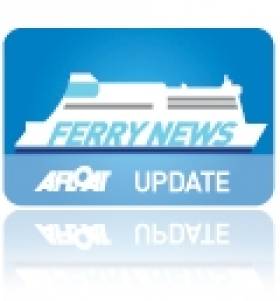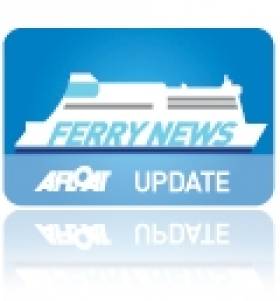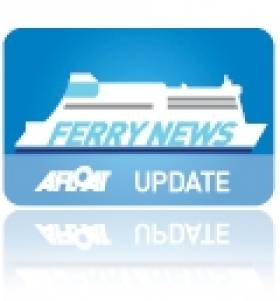Displaying items by tag: Fastcraft
High Seas and Cancelled Ferry Sailings
#CancelledSailings - Due to adverse weather conditions, some ferry sailings across the Irish Sea have been cancelled today and some crossings tomorrow remain in doubt.
As previously reported on Afloat.ie, Irish Ferries new chartered ro-pax ferry 'Epsilon' which was due to debut on the Dublin-Holyhead route yesterday, had to cancel sailings due to operational reasons.
In addition fast-craft Dublin-Holyhead sailings operated by Jonathan Swift today have also been cancelled.
All passengers travelling with Irish Ferries will be accommodated alternatively on the cruiseferry Ulysses, for further details, visit the company's website here, noting status of sailings schedule for tomorrow (Thursday) are also updated.
For the most up to date information on all sailings times of ferry operators and how to contact them directly, the AA provides an updated live service.
Stena Line to Resume ‘Express’ Service
In addition to the 'Express' service the St. Georges Channel route is served by the year-round operated conventional ferry, Stena Europe (1981/24,828 grt). The 1,386 passenger / 564-vehicle ferry recently underwent a £2m refurbishment and takes a more leisurely passage time of 3 hours 30 minutes.
For information on both fast-ferry and conventional ferry sailing schedules click HERE.
HSS Fast-Craft to Return on Dun Laoghaire Route
According to Stena Line over 70% of its passengers business is carried by the HSS Stena Explorer in the high season. It is felt that the 1996 Finnish built fast-craft is better suited for the service due to a loyal customer base which was reflected by repeat bookings and their preference of the HSS craft on the 120 minute (2 hour) route.
A daily single round trip is scheduled with sailings from Dun Laoghaire to Holyhead departing at 13:15hrs. The corresponding sailing from the Anglesey port departs at 10.00hrs and arrives at the Irish port at 12 noon. Sailings will operate through the summer until 13 September.
From there on Stena will make a decision as to its continuing schedule, though it is widely believed that the prospects of the fuel-thirsty, expensive to run HSS fast-craft service are likely to be at an end of an era.
Last month negotiations over the core issue of harbour fees were held between Stena Line and Dun Laoghaire Harbour Company. It is understood that the annual fee of €6.5m was dropped to €2m. The board of the harbour company has given a 'conditional green light' of a new ferry contract to Stena Line to run the service for the next two years with an option of a third year.
The service closed for its seasonal break earlier this year on 5 January with the 'Lynx' going into temporary lay-up at Holyhead's inner harbour to join the HSS Stena Explorer. The HSS had been 'wintering' at the port since September sailings were taken over by the Lynx.
Earlier this month the Stena Lynx III came to Dun Laoghaire to continue her lay-up period. The 1996 Tasmanian built craft will stay there before resuming seasonal sailings between Rosslare-Fishguard in tandem with the conventional ferry Stena Europe.
In the meantime the craft is berthed at the harbour's two-berth ferry terminal at St. Michaels Wharf. The HSS berth is only designed for this type of fast-craft whereas the other berth now occupied by the Lynx was built originally for conventional ferries but was re-configured last year to suit the fast-craft.
































































